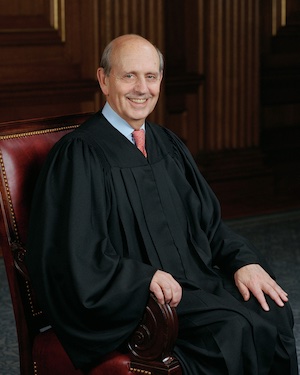By Catherine Hsu
Associate Justice Stephen Breyer (ΦΒΚ, Stanford University), who has served on the Supreme Court of the United States since 1994, plans to retire from his position this year.
Breyer was born in San Francisco, California, on August 15, 1938. He received degrees from Stanford University in California and Oxford University in England, where he studied economics at Magdalen College as a Marshall Scholar. He went on to earn a Bachelor of Laws from Harvard Law School and serve as an editor for Harvard Law Review. After three years at Harvard, Breyer graduated magna cum laude. In 1967, he married Joanna Hare, with whom he has three children named Chloe, Nell, and Michael.
His first year out of law school, Breyer worked as a law clerk under Supreme Court Justice Arthur Goldberg. Prior to becoming a Supreme Court Justice himself, Breyer also served as a Special Assistant to the Assistant U.S. Attorney General for Antitrust from 1965 to 1967, as an Assistant Special Prosecutor of the Watergate Special Prosecution Force in 1973, and in other positions.
Breyer returned to Harvard Law School in 1967 as an assistant professor, and within three years, he was promoted to full professor. At Harvard, Breyer taught administrative law full-time until 1980. He also served as a professor at the Harvard University Kennedy School of Government from 1977 to 1980, when he was then appointed to the U.S. Court of Appeals for the First Circuit.
In 1994, President Bill Clinton (ΦBK, Georgetown University) would appointed Breyer to the Supreme Court. Clinton’s first appointment to the Supreme Court had been Ruth Bader Ginsburg (ΦBK, Cornell University) the year before. Breyer was so dedicated that even a serious accident, in which he was hit by a car while crossing Harvard Square on his bike, could not deter him. According to Oyez, Breyer left the hospital where he was being treated for broken ribs and a punctured lung in order to make it to a meeting with Clinton.
During his time on the Supreme Court, Breyer has been a part of many major decisions, from abortion to gay marriage, to capital punishment and gerrymandering.
According to the Human Rights Campaign, “the Supreme Court is losing a brilliant legal mind and a champion of liberty and equality. Justice Breyer’s tenure on the Court established him as a defender of LGBTQ+ civil rights and his decisions delivered important progress toward our country’s founding ideal of a more perfect union that is inclusive and equitable for all.”
As an associate justice, Breyer was also a strong advocate against the death penalty. In 2015, Breyer wrote a landmark dissenting opinion for Glossip v. Gross, where he argued that the constitutionality of the death penalty should be reevaluated.
“In this Nation, we can have a death penalty that at least arguably serves legitimate penological purposes, or we can have a procedural system that at least arguably seeks reliability and fairness in the death penalty’s application,” Breyer wrote in his statement. “We cannot have both.”
Five years later in 2020, Breyer reiterated his critique of the death penalty in the case United States v. Dustin John Higgs.
Throughout the years, Breyer has become known as the most analytic and pragmatic justice, one who considers real-life consequences of the Court’s decisions. In 2005, he published a book titled Active Liberty: Interpreting Our Democratic Constitution. The book, which The New Republic asserts “deserves a place of honor in national debates, now and in the future, about the role of the Supreme Court in American life,” discusses the role of judicial deference to Congress and adapting to meet the changing needs of the American people.
Breyer has also published two other books, Making Our Democracy Work: A Judge’s View and The Court and the World.
Following the news of Breyer’s retirement, the other Justices released statements speaking on Breyer’s impact throughout his Supreme Court tenure.
“Justice Breyer’s optimism and profound love of country, expressed through word and deed, have inspired countless others. He is a tireless and powerful advocate for the rule of law,” wrote Chief Justice John G. Roberts, Jr. (ΦΒΚ, Harvard University).
Justice Elena Kagan (ΦΒΚ, Princeton University) wrote, “He believes in making institutions work; to strengthen this one, he listens to other views with care and generosity, and does everything he can to find common ground. And he is the best possible friend.”
Phi Beta Kappa is proud to count 42 current and former Supreme Court Justices as members, a strong indication of how vital the arts and sciences are to a vibrant culture and democracy.
For a list of opinions authored by Justice Breyer, click here.
Catherine Hsu is a recent graduate of the University of California,Berkeley where she majored in political science and art practice. She was inducted into Phi Beta Kappa there in May 2021. UC Berkeley is home to the Alpha of California chapter of Phi Beta Kappa.




